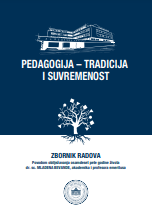ODGOJNA ULOGA RAZREDNIKA U OSNOVNOJ ŠKOLI - RAZREDNIK VODITELJ -
THE EDUCATIONAL ROLE OF THE CLASS TEACHER IN PRIMARY SCHOOL - CLASS LEADER
Author(s): Ivica Augustinović
Subject(s): Education, Ethics / Practical Philosophy, School education, Methodology and research technology, Pedagogy
Published by: Filozofski fakultet Univerziteta u Sarajevu
Keywords: Class teacher; restitution; sociometric methods; egalitarian ethics;
Summary/Abstract: The significance, importance, and purpose fullness of the role of the primary school teacher is increasingly being re-examined in the educational system or systems in Bosnia and Herzegovina. Today, the classroom teacher is seen as a person who only transmits or receives information about the success of students and their behavior, about the justification or unjustification of absences, and thereby loses the role of the one who primarily initiates the activities of students and teachers, who monitors phenomena and relationships in the class or coordinates educational actions in department. Such passive observation causally projects ideas in the direction of abolishing class community hours because children in schools are overloaded with teaching hours. Unacceptable, even if it’s a joke! The aim of this paper is to re-aware but also to point to “education” as the primary leadership role of classroom teachers in primary schools, and to problematize and present the objective point of view of the classroom teachers themselves on the position and role of classroom teachers in primary schools, the necessity of teacher education to perform the function of classroom teachers, but also knowledge of the developmental characteristics of students, especially in the period of puberty, the typification of the role of the classroom teacher in elementary school by the students, as well as the emergence of a contemporary mythological view of the role of the classroom teacher in the 21st century. Advocating a new paradigm of the teacher’s role, which is primarily reflected in a more pragmatic methodical approach through the application of restitution in the work of the teacher as a way to discipline but “without coercion” and the application of sociometric research methods in the work of the teacher in order to see those relationships between students that are not visible to the eye. Forms of work of primary school teachers, the importance of knowing parenting styles and the promotion/advocacy of egalitarian ethics when it comes to cooperation with parents will represent a step forward compared to the current practice in primary schools.
Book: Pedagogija – tradicija i suvremenost - zbornik radova
- Page Range: 181-198
- Page Count: 18
- Publication Year: 2025
- Language: Croatian
- Content File-PDF

